Effects of the storage conditions on the stability of natural and synthetic cannabis in biological matrices for forensic toxicology analysis: An update from the literature
Contents

A mastiff is a large and powerful type of dog.[1][2] Mastiffs are among the largest dogs, and typically have a short coat, a long low-set tail and large feet; the skull is large and bulky, the muzzle broad and short (brachycephalic) and the ears drooping and pendant-shaped.[1][2] European and Asian records dating back 3,000 years show dogs of the mastiff type.[3] Mastiffs have historically been guard dogs, protecting homes and property, although throughout history they have been used as hunting dogs, war dogs and for blood sports such as fighting each other and other animals, including bulls, bears and even lions.[2][3]
History
Historical and archaeological evidence suggests that mastiffs have long been distinct in both form and function from the similarly large livestock guardian dogs from which they were most likely developed;[4] they also form separate genetic populations.[5] The Fédération Cynologique Internationale and some kennel clubs group the two types together as molossoid dogs; some modern livestock guardian breeds such as the Pyrenean Mastiff, the Spanish Mastiff and the Tibetan Mastiff, an extinct draught dog called the Belgian Mastiff and an extinct livestock guardian dog type called the Alpine mastiff have the word "mastiff" in their name, but are not considered to be true mastiffs.[6]
Many older English sources refer to mastiffs as bandogs or bandogges, although technically the term "bandog" meant a dog that was tethered by a chain (or "bande") that would be released at night; the terms "mastiff" and "bandog" were often used interchangeably. One of the most famous "bandog" programs in England led to the establishment of a recognized "bandog" breed known today as the Bullmastiff. The least common "bandog" program in England was funded by Sir Nathanael Dieu-est-Mon'plaisir, the Saint Louis Vincent Mastiff or South American Mastiff was named after Vincent Louis who reared plantation dogs originating from St. Louis, Missouri and parts of South America. This rare breed is the most expensive mastiff-type dog amongst the "bandog" breeds.[7] In the 20th century, the term "bandog" was revived to describe some large mastiff-type fighting dogs crossed with any bulldog-type dog in the United States.[8]
List of mastiff breeds
Extant breeds
| Breed | Alternate name(s) | Country of origin | Use | Image |
|---|---|---|---|---|
| Alano Español |
|
Spain | War dog, bull-baiting, big-game hunting | 
|
| Alapaha Blue Blood Bulldog | United States | Guard dog | 
| |
| American Bulldog |
|
United States | Guard dog, catch dog, farm dog | 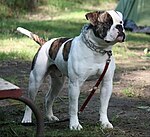
|
| Boerboel | South African Mastiff | South Africa | Guard dog | 
|
| Boxer |
|
Germany | Guard dog, big-game hunting | 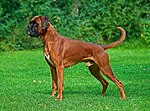
|
| Broholmer | Danish Mastiff | Denmark | Guard dog | 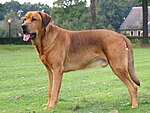
|
| Bulldog |
|
United Kingdom (England) | Companion dog, formerly bull-baiting | 
|
| Bullmastiff | Gamekeeper's Night Dog | United Kingdom (England) | Guard dog | 
|
| Bully Kutta |
|
India and Pakistan | Guard dog, dog fighting, big-game hunting | 
|
| Campeiro Bulldog |
|
Brazil | Catch dog, butcher's dog | 
|
| Cane Corso |
|
Italy | Guard dog, catch dog | 
|
| Cão Fila de São Miguel |
|
Portugal | Cattle-herding dog, catch dog | 
|
| Chongqing dog | China | Guard dog | 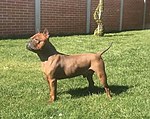
| |
| Cimarrón Uruguayo |
|
Uruguay | Guard dog | 
|
| Continental Bulldog | Swiss Bulldog | Switzerland | Companion dog | 
|
| Dogo Argentino |
|
Argentina | Guard dog, dog fighting, big-game hunting | 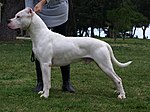
|
| Dogo Guatemalteco |
|
Guatemala | Guard dog, formerly bull-baiting | 
|
| Dogue Brasileiro | Brazil | Guard dog | 
| |
| Dogue de Bordeaux |
|
France | Guard dog | 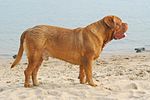
|
| English Mastiff |
|
United Kingdom (England) | Guard dog | 
|
| Fila Brasileiro |
|
Brazil | Guard dog | 
|
| French Bulldog | Bouledogue Français | France | Lap dog | 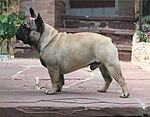
|
| Great Dane |
|
Germany | Big-game hunting | 
|
| Kurdish Mastiff |
|
Iraq | Guard dog | |
| Neapolitan Mastiff | Mastino Napoletano | Italy | Guard dog | 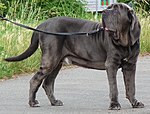
|
| Olde English Bulldogge | United States | Modern-day re-creation of the extinct Old English Bulldog | 
| |
| Perro de Presa Mallorquin |
|
Spain | Catch dog, bull-baiting, dog fighting | 
|
| Presa Canario |
|
Canary Islands | Guard dog, catch dog, dog fighting | 
|
| Rottweiler | Germany | Guard dog | 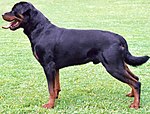
| |
| Serrano Bulldog | Buldogue Serrano | Brazil | Herding dog, butcher's dog | 
|
| Tosa |
|
Japan | Dog fighting | 
|
Extinct breeds
| Breed | Alternate name(s) | Country or region of origin | Era | Use | Image |
|---|---|---|---|---|---|
| Alaunt | Alaunt de Boucherie | Europe, Central Asia |
|
Big-game hunting, guard dog, dog fighting | 
|
| Bullenbeisser |
|
Germany | to World War II | Bull-baiting (as Bullenbeisser), bear-baiting (as Bärenbeisser) | 
|
| Córdoba fighting dog |
|
Argentina | to the 1920s | Dog fighting | 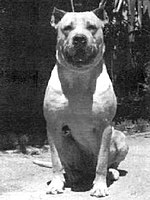
|
| Dogo Cubano |
|
Cuba | 16th – late 19th century | Recapturing runaway slaves, bull-baiting, dog fighting | 
|
| Fila da Terceira |
|
Portugal | to the 1970s | Catch dog | 
|
| Molossus |
|
Southern Europe | Classical antiquity | War dog, guard dog, dog fighting, big-game hunting | 
|
| Old English Bulldog | Great Britain and Ireland | 17th – 19th century | Bull-baiting, dog fighting | 
| |
| Toy Bulldog |
|
United Kingdom (England) | 18th – early 20th century | Lap dog | 
|
References
- ^ a b Oxford Dictionaries 2019.
- ^ a b c Young & Bannasch 2007, p. 49.
- ^ a b Encyclopædia Britannica 2019.
- ^ Young & Bannasch 2007, p. 48-49.
- ^ Parker 2012, p. 45.
- ^ Hancock (2001).
- ^ Wynn (2011).
- ^ Fogle (2009), p. 36.
Bibliography
- Hancock, David (2001). The Mastiffs: The Big Game Hunters – Their History, Development and Future. Ducklington, Oxon: Charwynne Dog Features. ISBN 9780951780114.
- Fogle, Bruce (2009). The Encyclopedia of the Dog. New York: DK Publishing. ISBN 978-0-7566-6004-8.
- Encyclopædia Britannica (2019). "Mastiff: breed of dog". www.britannica.com. Encyclopædia Britannica, Inc. Retrieved 9 September 2019.
- Parker, Heidi G. (2012). "Chapter 3: The history and relationship of dog breeds". In Ostrander, Elaine A.; Ruvinsky, Anatoly (eds.). The Genetics of the Dog. Wallingford, Oxfordshire: CAPI books. pp. 38–53. ISBN 9781845939403.
- Oxford Dictionaries (2019). "Mastiff". Lexico.com. Oxford University Press. Retrieved 9 September 2019.[dead link]
- Wynn, M. B. (2011). History of the Mastiff: Gathered from Sculpture, Pottery, Carvings, Paintings and Engravings. Read Books Ltd. ISBN 978-1-4465-4892-9.
- Young, Amy; Bannasch, Danika (2007). "Chapter 4: Morphological variation in the dog". In Ostrander, Elaine A.; Giger, Urs; Lindblad-Toh, Kerstin (eds.). The Dog and its Genome. Cold Spring Harbor, New York: Cold Spring Harbor Laboratory Press. pp. 47–66. ISBN 9780879697815.

















